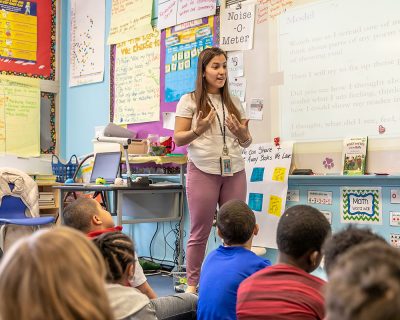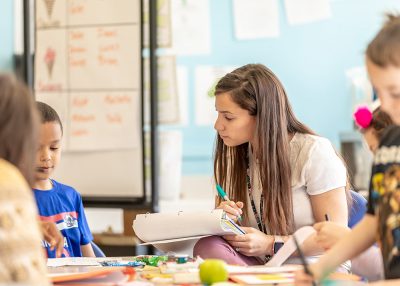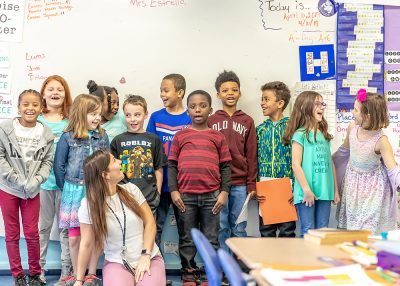
In our recurring 10 Questions series, the Neag School catches up with students, alumni, faculty, and others throughout the year to offer a glimpse into their Neag School experience and their current career, research, or community activities.
Aryliz (Crespo) Estrela ’16 (ED), ’17 MA is now in the midst of her third year of teaching after having completed the Neag School’s five-year Integrated Bachelor’s/Master’s Program in 2017. Looking back, she shares some sage advice about what she learned during her first year in the classroom — one that she sums up in three words: “Fun. Insightful. Courageous.”
What inspired you to become an educator? My second-grade teacher Mrs. May. From kindergarten to college, I never had a teacher who looked like me except for Mrs. May. She was the only one. Every teacher I had was white. Mrs. May was Puerto Rican and always encouraged diversity in the classroom. I remember she would say something silly to me in Spanish and all of my peers would get excited because they wanted to learn what she said. But my favorite was when Mrs. May organized a day for parents to come and visit and bring a dish that represented their culture. Mrs. May not only made learning fun for me, but she made it something I could connect to for the simple fact that she and I were both Puerto Rican.
“Forming authentic relationships is what builds a strong support system, and that can only come by putting assumptions aside and letting someone tell you who they really are.”
— Aryliz (Crespo) Estrela ’16 (ED), ’17 MA
Second-grade teacher, Manchester, Conn.
What are three major lessons you have learned in your first year of teaching? The three major lessons I learned as a first-year teacher were: Don’t believe everything you hear. Take risks. Stand up for yourself even when it feels uncomfortable.
As a first-year teacher, you have plenty of people that want to give you the “scoop” on students or even other coworkers. I’m sure their intentions come from a place of wanting to help. However, I learned that just because you don’t know anything yet doesn’t mean you shouldn’t figure things out on your own. I had several people tell me certain students or colleagues were going to be a challenge. Anyone who knows me well knows that I’m going to challenge that. After I got to know those students and colleagues, it turns out all they needed was someone to be quick to listen and slow to speak. The more I did this, the more I found myself connecting and forming positive relationships — to the point where I had others asking me how I was doing this. Forming authentic relationships is what builds a strong support system, and that can only come by putting assumptions aside and letting someone tell you who they really are.

As for taking risks, I remember it to this day. I was so excited because I was going to have my students create “All About Me” books in which they dive deeper into understanding what diversity means in order to share with the class who they are. But I had some colleagues state some concerns — which, again, their intentions were to help. They were worried that my boss wouldn’t approve because I’m using a time in the day that should be for something else. I took this concern and found a way to incorporate what my students would have been doing anyway and I went forward with the books. One day my kids were happily working on their “Family” chapter of their books when I heard keys turning my door, and I knew it was my boss. As a first-year teacher, I start to panic and sweat. But then I said to myself: No, it’s OK to take risks, and it’s going to be OK. To my surprise, my boss loved the idea, continues to encourage me with the books, and loves reading more about my students, as do I. The more I know who my students say they are, the more I can understand where they come from.
“Hold your head up high. Give it the very best you can every day — and load up on chocolate. Not every day will be a success, but at the end of the day, the kids make it all worth it.”
Lastly, always stand up for yourself. The year I got hired, I was so excited because there was another Latina teacher in my school. I was so happy because I wouldn’t be the only one. However, slowly but surely this happiness slowly turned into anger and sadness. Reason being, her name was a lot easier to say than mine. Because of that, many of my colleagues would call me by her name instead of my own. For me, this was important because this was my identity. I take pride in the name my parents gave me. It’s who I am, so by calling me someone else, it made me feel invisible and as though I didn’t matter. I finally worked up the courage to have conversations with those peers and explain why they’ve offended me and to ask them kindly to call me by MY name. It was a huge lesson for them, and they were grateful that I approached them about it.

How did the Neag School prepare you to become an educator? The courses and experiences provided at the Neag School of Education really allowed me to feel empowered and ready to go into the teaching career. I knew most of the curriculum used at schools, how to manage behavior, and be a team player.
Is there a single piece of advice you received from a Neag School professor that has stuck with you? Make mistakes and learn from them.
What do you consider to be your greatest strengths as an educator? I believe that I aim to fully understand my students as best I can, and that is because I look at my students more than a data point. What do they bring to the classroom? They are sons, daughters, cousins, grandkids … they each bring differences that make the classroom unique. I embrace those differences and run with them.
What are some goals you have for this school year? I want to have more of a relationship with the parents. Yes, although a phone call or message via Remind is appreciated by them, I know that they wish they could know and do more. So, this year I plan on involving my parents in the classroom more — whether through a read-aloud or just to help in the classroom. I believe that teamwork between me and the parent or guardian is how our children become successful.
Looking back, what was your greatest worry starting out as a new teacher? My greatest worry was if I was going to be able to control my classroom. I was hired as a fourth-grade teacher and the majority of my class was already taller than me. So, I thought for sure they’d walk all over me. However, that wasn’t the case at all. Turns out fourth-graders are big first-graders who need love, too.
What advice would you give future Neag School graduates on their first year of teaching? Hold your head up high. Give it the very best you can every day — and load up on chocolate. Not every day will be a success, but at the end of the day, the kids make it all worth it.
What do you consider to be the most significant challenge for educators today? Meeting the needs of our students who need it the most. There is never enough time in the day. If the students don’t meet grade level, it is assumed they will catch up; the majority of the time, it doesn’t happen.
What are you most proud of from your first years of teaching? I was most proud of how much I embraced diversity and made it a point that other teachers should be doing it, too. So much so that the district recorded me explaining it to my classroom and put it on the school website.
 Facebook
Facebook
 Twitter
Twitter
 LinkedIn
LinkedIn
